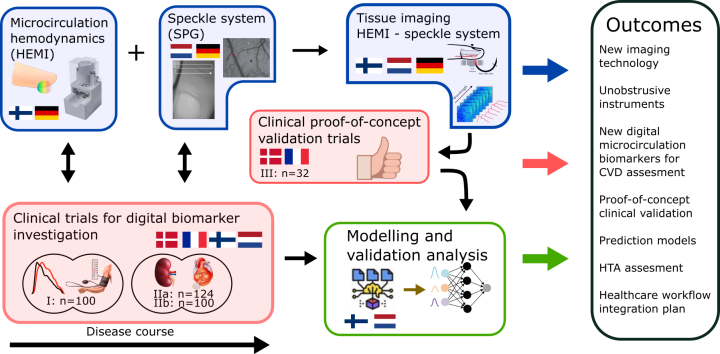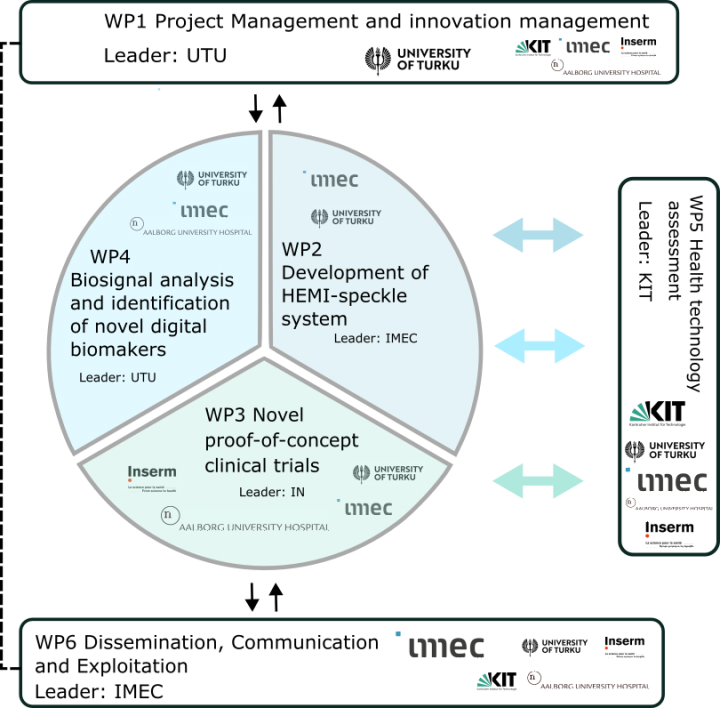Project
STIMULUS project consortium develops new non-invasive, convenient, low-cost and easy-to-use imaging technology that can measure new digital biomarkers from microcirculation for early detection of cardiovascular diseases. The novel technology will enable earlier detection of heart failure and chronic kidney disease, which will substantially decrease cardiovascular events in the European population.
For both heart failure and chronic kidney disease patients, it is important to diagnose microvascular dysfunction and monitor the deterioration of microvascular function in early phases of the disease progress. Our proposed technology HEMI-speckle system is an integrated solution of two existing prototypes, namely, the multi-spectral optical sensory system and the speckle plethysmography (SPG) system. To understand the diagnostic value of these technologies for both HF and CKD populations, two clinical trials will be executed. At the same time, the new integrated solution will be developed. Adjustment of the existing individual technologies can be made prior to conduct of the validation trial to guarantee a proper conduct of the trial in a patient population in a clinical setting. Lessons learnt from these clinical trials can be used a) for the development of the integrated HEMI-speckle system, b) to identify new digital biomarkers from the individual and integrated technology, c) to analyse the sensitivity and specificity of the two technologies for each population separately, and d) to prove the validity of the technologies for the early assessment of microvascular function in the target population.

A third clinical trial will run in a later phase, when the HEMI-speckle prototype is ready. In this trial, the new technology will be verified on healthy volunteers and hypertensives, after the validation of the underlying technologies on a relevant patient population has been done. The additional new digital biomarkers obtained from the unique combination of the two individual technologies can be explored in this phase.
Health technology assessment provides prospective knowledge about the possible or probable consequences of new and emerging technologies. In the process, intended and non-intended impacts of the technology application are identified. Anticipating the spectrum of possible consequences of technology, at an early stage, helps to make good use of the potential of progress and to be able to minimize risks or even to avoid them.
STIMULUS WORK PACKAGES
Work package 1: Project management and innovation management
Work package leader: University of Turku
Objectives:
- To monitor and guarantee a smooth flow of the project to achieve the ambitious objectives and timely completion of the tasks.
- To ensure a sound financial and administrative management and coordination of the project, as well as the data management and addressing the ethical issues.
- To ensure the high scientific quality of the research carried out in the project.
- To ensure a continuous connection, communication and knowledge exchange between the partners and key stakeholders and liaison with the European Commission (EC).
Work package 2: Development of the HEMI-speckle system
Work package leader: Imec the Netherlands
Objectives:
- Increase the technological readiness level (TRL) of HEMI and SPG device to allow development of a mature prototype for the use in clinical trials.
- By integration of HEMI and SPG we will enable an innovative instrument “HEMI-Speckle” for measuring microvascular hemodynamic alterations that link to early detection of CVDs.
- Integration of the novel technique into a smart toilet for proof-of-concept in a non-obtrusive at home measurement device.
Work package 3: Novel proof-of-concept clinical trials
Work package leader: Inserm
Objectives:
- Novel and comprehensive proof-of-concept dataset from clinical trials for method development and validation of new digital biomarkers for detection of HF and chronic kidney disease.
Work package 4: Biosignal analysis and extraction of novel digital biomarkers
Work package leader: University of Turku
Objectives:
- Identify digital biomarkers of the micro-circulation related to (the development of) HF/CKD/CVD. Develop automated algorithms for robust extraction of the biomarkers.
- Determine sensitivity and specificity of new digital biomarkers for disease and disease stage classification of HF and CKD.
- Validation of new integrated technology as a tool for disease classification.
Work package 5: Health technology assessment
Work package leader: Karlsruhe Institute of Technology
Objectives:
- To provide an early Health Technology Assessment, focusing on the Ethical, Legal and Social Aspects associated with the development of the finger-clip device and on the smart toilet demonstrator.
- To conduct a medical device regulation assessment on the novel technology.
- To conduct co-creation workshops assuring that the technology development meets its users’ needs.
Work package 6: Dissemination, Communication & Exploitation
Work package leader: Imec the Netherlands
Objectives:
- To develop and implement an effective, multi-stakeholder and multi-channel dissemination and exploitation strategy to maximize the impact: 1. to increase the public and the stakeholders’ awareness of the project, its actions, developments, initiatives and events.
- To stimulate the impact of the project results among the target groups.
- To foster uptake of the developed methods and frameworks beyond the consortium.

Work package 7: Portfolio activities
Work package leader: University of Turku
Objectives:
- Strengthen the prospects for successful project completion and performing the initial steps of transition towards market by developing synergies and collaborations among the projects funded under the 2022 EIC Pathfinder Challenge call – Towards the healthcare continuum: technologies to support a radical shift from episodic to continuous healthcare (HORIZON-EIC-2022-PATHFINDERCHALLENGES-01-04).
